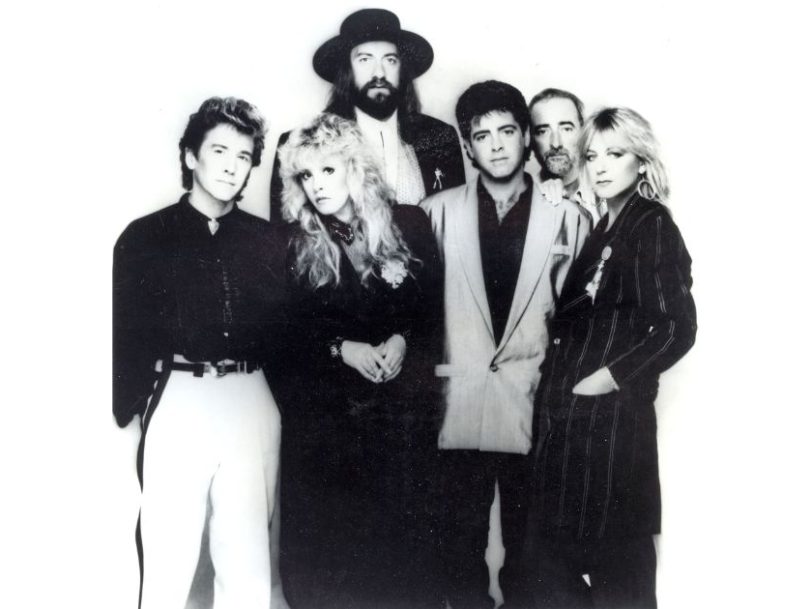In a career that spans over half a century, Fleetwood Mac have given fans plenty of drama, from countless line-up changes to romantic entanglements and tales of rock’n’roll debauchery. You’ve heard the rumours, but here are ten lesser-known Fleetwood Mac facts you need to know…
Listen to the best of Fleetwood Mac here, and check out the Fleetwood Mac facts you need to know, below.
https://open.spotify.com/playlist/37i9dQZF1DX2s2cwqMcO31?si=9a56e0dd53394552
1: They lost an early member to a religious cult
Well established among Fleetwood Mac facts is the changeable state of their line-up. After founder member Peter Green left the band in May 1970, the group continued, with guitarists Danny Kirwan and Jeremy Spencer stepping up. A curious truth, however, is the reason behind Spencer’s departure. After the guitarist failed to turn up for a gig at the Whiskey A Go Go, in Los Angeles, the following February, the group embarked on a search which lasted several days, during which it transpired that Spencer had joined the Californian religious cult The Children Of God. Spencer always maintained that he joined the cult of his own free will, but he later told Classic Rock that he regretted the manner of his departure from Fleetwood Mac. “The way I left was wrong and a mistake,” he admitted. “I should’ve told them right away, but I was desperate.”
2: Christine McVie’s talents extended beyond music to album covers
Christine McVie joined Fleetwood Mac in 1970, after marrying the band’s bassist, John McVie. Though she was not an official member of the group during the recording of their fourth studio album, Kiln House, she contributed backing vocals and keyboards during recording sessions, and created the album’s distinctive sleeve illustration. McVie also submitted artwork for the band’s follow-up album, Bare Trees, which, though it wasn’t used, currently sits in the collection of the V&A, in London.
3: A fake Fleetwood Mac were sent out on tour in 1973
As tensions between the Fleetwood Mac bandmates mounted during their 1973 US tour, guitarist Bob Weston was fired, and the tour was cancelled. Facing a hefty bill and feeling that his reputation was at stake, manager Clifford Davis sent a group of musicians on the road in the band’s place, calling them The New Fleetwood Mac. When audiences clocked the deception, that tour also fell apart and the remaining dates were cancelled. The original band then reunited in September 1974 and decided to manage themselves.
4: John McVie’s love of penguins inspired an album title
After John and Christine McVie married, they moved to Chalk Farm, North London. The couple were animal lovers, and London Zoo was nearby. John became an associate member of the Zoological Society Of London, which meant that, as he said, “You paid an annual fee and could go in [to London Zoo] free at any time.” John was a particular fan of the zoo’s penguins and would spend hours watching and taking photographs of them. His love for the birds not only inspired the title and sleeve of their 1973 album, Penguin, but, in one of the most frivolous Fleetwood Mac facts, gave the band a mascot – the top hatted-penguin later used on merch and album sleeves.
5: Mick Fleetwood stole his own wooden balls
While the sleeve of 1977’s mega-selling Rumours album is regarded as one of the best album covers of all time, a small detail might have passed some fans by. Dangling between drummer Mick Fleetwood’s legs is a pair of what seem to be wooden balls – actually lavatory chains that Fleetwood liberated from the bathroom of a venue the group played in their early days. Making for one of the more unusual Fleetwood Mac facts, the balls became a lucky charm for Fleetwood, who wore them at concerts from that point on. It was a fittingly provocative gesture, as Fleetwood explained to Rolling Stone: “In truth, I started off as a blues player. The whole ethic of a lot of blues music is slightly suggestive, might I say. And suitably, I walked out on stage with these two lavatory chains with these wooden balls hanging down, and after that, it just stuck.” When Fleetwood lost the balls on tour, he had a replacement pair made by a carpenter.
6: ‘Rumours’ had a very different working title
Rumours is the perfect name for an album full of material exploring the tangled interpersonal relations of Fleetwood Mac in 1977, but the record’s working title was “Yesterday’s Gone”. The name was taken from the chorus of Christine McVie’s Don’t Stop – a song that looked to the future after her separation from John.


